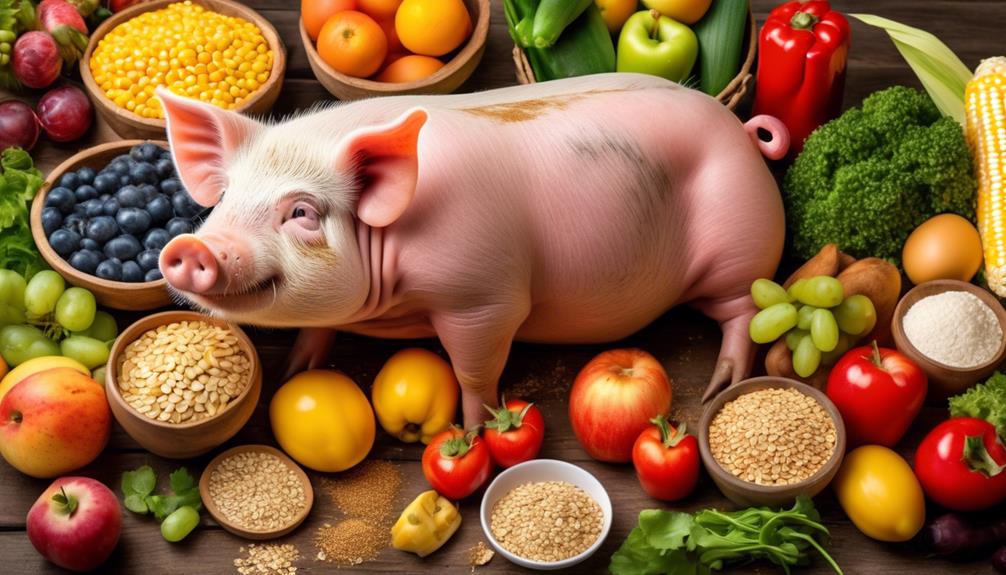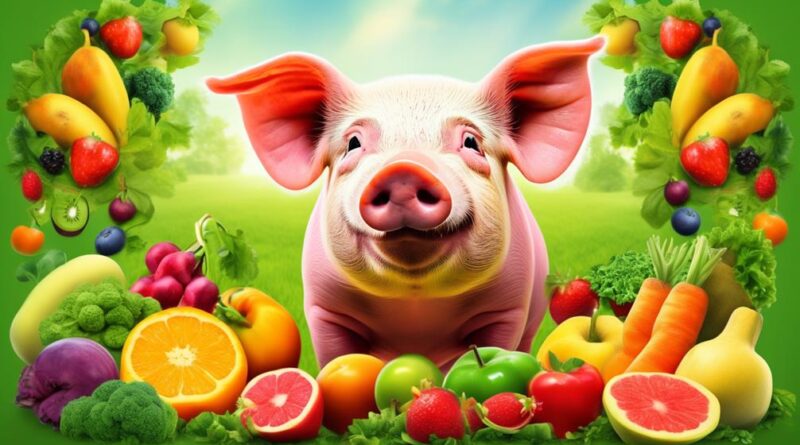What Is the Top Nutrition for Pig's Healthy Growth?
When it comes to raising pigs, it's like tending to a garden; you want to ensure you're providing the best nutrients to foster healthy growth.
But how do you know what the top nutrition is for your pig's well-being?
Well, you might be surprised to learn that it's not just about feeding them; it's about feeding them right. The key lies in understanding the specific protein requirements, essential vitamins, minerals, fiber, energy sources, water, and the right balance of carbohydrates for optimal growth.
So, where do you begin?
Protein Requirements for Pigs
To ensure healthy growth and development, pigs require a diet that's rich in high-quality proteins. Meeting the amino acid requirements is essential for protein quality and overall health. The amino acids crucial for pigs include lysine, methionine, threonine, and tryptophan.
These are often deficient in many feed sources, so providing protein supplementation is necessary to meet the pig's nutritional needs.
When it comes to protein quality, not all sources are created equal. Soybean meal is a commonly used protein source for pig diets due to its high protein content and amino acid profile. Other options for protein supplementation include fish meal, blood meal, and even certain animal by-products. These sources can help meet the amino acid requirements and enhance the overall quality of the pig's diet.
In addition to protein supplementation, it's important to consider the feed sources for pigs. Grains such as corn, barley, and wheat are often used as energy sources in pig diets but aren't always sufficient to meet protein requirements. Therefore, incorporating protein-rich sources into the feed is crucial for providing a balanced diet. It's also essential to consider the digestibility of the proteins from different feed sources to ensure that the pigs can efficiently utilize the nutrients for growth and development.
Essential Vitamins for Pig Growth
Meeting the amino acid requirements for protein quality in pig diets sets the foundation for understanding the essential vitamins necessary for their growth and development. Vitamin deficiencies in pigs can lead to various health issues and hinder their growth.
Vitamin A is crucial for pig growth and vision. Deficiencies in vitamin A can result in night blindness and decreased growth rates in pigs.
Vitamin D is necessary for calcium and phosphorus absorption, which are vital for bone development. A deficiency in vitamin D can lead to rickets and weak bones in pigs.
Vitamin E acts as an antioxidant, protecting cells from damage, and is essential for immune function. Inadequate vitamin E can result in muscular dystrophy and poor reproductive performance in pigs.
Additionally, pigs require vitamin K for blood clotting, and deficiencies can lead to hemorrhage and prolonged bleeding.
Vitamin supplementation for pigs is essential to ensure they receive adequate amounts of these vital nutrients. Commercial pig feeds often incorporate essential vitamins, but it's crucial to monitor and supplement their diet if deficiencies are observed.
Importance of Minerals in Pig Nutrition
Minerals play a crucial role in supporting the overall health and growth of pigs by contributing to various physiological functions. These functions include bone development, enzyme activity, and immune function. Mineral supplementation is essential for ensuring that pigs receive the necessary nutrients for optimal growth and health.
Calcium, phosphorus, magnesium, and potassium are among the most vital minerals for pigs. These minerals are crucial for bone development, muscle function, and nerve transmission. Inadequate mineral supplementation can lead to skeletal deformities and other health issues in pigs.
Mineral absorption is another critical aspect of pig nutrition. Pigs require a proper balance of minerals to support their growth and well-being. Factors such as the source and form of minerals, as well as interactions with other dietary components, can affect mineral absorption.
For example, phytate, a form of phosphorus found in many plant-based feed ingredients, can bind to minerals and reduce their availability for absorption. Therefore, understanding the factors that influence mineral absorption is crucial for formulating diets that meet the pigs' mineral requirements.
Fiber in Pig's Diet
Incorporating a variety of high-fiber foods into your pig's diet can significantly improve their overall digestive health and well-being. Fiber plays a crucial role in maintaining digestive health in pigs. It aids in the movement of food through the digestive system, prevents constipation, and supports the growth of beneficial gut microbiota. Including fiber-rich foods such as vegetables, fruits, and hay in your pig's diet can help ensure a healthy and balanced nutritional intake.
Digestive health is essential for the overall well-being of your pig. Fiber acts as a natural regulator, promoting regular bowel movements and preventing gastrointestinal issues. By keeping the digestive system healthy, fiber can contribute to your pig's overall growth and vitality. Furthermore, fiber serves as a prebiotic, nourishing the beneficial bacteria in the gut microbiota. This, in turn, supports the pig's immune system and helps in the breakdown of certain indigestible components of their diet.
Moreover, the presence of adequate fiber in the diet can also reduce the risk of certain digestive disorders in pigs, such as colitis and gastric ulcers. It provides a feeling of fullness, regulating food intake and preventing obesity. Therefore, ensuring that your pig's diet includes a sufficient amount of fiber is crucial for their long-term health and growth. By paying attention to their fiber intake, you can help your pig maintain a healthy digestive system and overall well-being.
Energy Sources for Pig's Healthy Growth
To support your pig's healthy growth, ensuring a balanced intake of energy sources is essential, building upon the foundation of digestive health established through fiber-rich foods.
Here are some essential energy sources for your pig's healthy growth:
- Dietary Fats for Pigs: Including dietary fats in your pig's diet is crucial for providing a concentrated source of energy. Fats are highly digestible and can help meet the high energy demands of growing pigs.
- Carbohydrate Sources for Pigs: Carbohydrates are another important energy source for pigs. Including carbohydrates such as grains (corn, barley, wheat) and root vegetables (potatoes, sweet potatoes) in the diet can provide readily available energy for growth and development.
- Balanced Energy Feed: It's important to ensure a balanced energy feed that combines different sources of energy, including fats, carbohydrates, and other nutrients. This can help maintain steady and sustainable energy levels for your pig's growth.
- Proper Rationing: Ensuring proper rationing of energy sources according to your pig's growth stage is essential. Younger pigs may require a different energy ratio compared to mature pigs, so adjusting the energy sources in their diet accordingly is crucial for their healthy development.
Water: Crucial for Pig's Nutrition
Ensuring an adequate supply of water is critical for supporting your pig's nutrition and overall health. Hydration management is essential to ensure that your pig is receiving enough water for optimal growth and well-being. Pigs require access to clean, fresh water at all times to support their bodily functions, digestion, and overall health. Proper hydration is crucial for nutrient absorption, temperature regulation, and waste excretion.
Water quality is another important aspect of pig nutrition. It's important to provide your pig with clean and uncontaminated water to prevent the spread of diseases and ensure optimal growth. Regularly check the quality of the water supply to ensure that it's free from harmful chemicals, toxins, and pathogens. Contaminated water can lead to health issues and hinder your pig's growth and development.
Monitoring your pig's water intake is essential for their overall well-being. Keep track of how much water your pig is consuming daily and adjust the supply as needed, especially during hot weather or periods of increased physical activity. Adequate hydration is crucial for maintaining appetite, digestion, and overall health. Make sure that water sources are easily accessible to the pigs, and regularly clean and maintain water containers to prevent contamination.
Balancing Pig's Diet With Carbohydrates

How can carbohydrates be effectively balanced in your pig's diet to support healthy growth and development?
Balancing your pig's diet with carbohydrates is crucial for providing the energy needed for growth and daily activities. Here are four essential points to consider when incorporating carbohydrates into your pig's diet:
- Carbohydrate sources: Utilize a variety of carbohydrate sources such as grains (corn, barley, wheat), root vegetables (potatoes, sweet potatoes), and fruits to provide a diverse range of nutrients and energy sources for your pig.
- Digestible carbohydrates: Ensure that the carbohydrates included in the diet are easily digestible for pigs. Corn and barley are examples of highly digestible carbohydrates that can be included in the diet to support efficient utilization of nutrients.
- Balanced proportions: Pay attention to the proportions of carbohydrates in the overall diet. While carbohydrates are essential, they should be balanced with proteins, fats, vitamins, and minerals to provide a well-rounded diet for your pig.
- Quality and freshness: Select high-quality carbohydrate sources and ensure they're fresh and free from mold or contamination. Fresh and high-quality carbohydrates will provide the best nutritional value for your pig's diet.
Nutritional Considerations for Piglets
When raising piglets, it's important to provide a well-balanced diet that supports their rapid growth and development. Colostrum intake plays a vital role in the early stages of a piglet's life. Colostrum, the first milk produced by the sow after farrowing, is rich in essential nutrients and antibodies that boost the piglet's immune system and provide protection against diseases. It's crucial to ensure that piglets receive an adequate amount of colostrum within the first few hours of birth to support their overall health and well-being.
As piglets grow and mature, the gradual transition from sow's milk to solid food becomes essential. Transition diets are formulated to meet the nutritional requirements of piglets during this critical stage. These diets typically contain highly digestible proteins, essential amino acids, and a balanced blend of vitamins and minerals to support healthy growth. It's important to introduce transition diets gradually, allowing piglets to adapt to solid food while continuing to receive the necessary nutrients for their development.
Frequently Asked Questions
What Are the Most Common Health Issues That Can Arise From a Pig's Diet and How Can They Be Prevented?
To maintain your pig's health, focus on preventing obesity and promoting digestive health. Watch their food intake, provide a balanced diet, and ensure they have access to clean water. Regular exercise and proper portion control are also essential.
Are There Any Specific Feeding Techniques or Practices That Can Help Optimize a Pig's Digestion and Nutrient Absorption?
To optimize a pig's digestion and nutrient absorption, consider feeding techniques like providing a balanced diet, ensuring access to clean water, and avoiding sudden diet changes. These practices can help maintain healthy digestion and nutrient utilization.
How Can Environmental Factors, Such as Temperature and Housing, Impact a Pig's Nutritional Needs and Overall Health?
When it comes to your pig's nutritional needs and overall health, you should consider the impact of climate, feed quality, temperature regulation, and housing design. These factors can significantly influence your pig's well-being.
What Role Do Probiotics and Other Supplements Play in Supporting a Pig's Digestive Health and Immune System?
To support a pig's digestive health and immune system, probiotics offer benefits. They aid in gut health improvements, helping with nutrient absorption and immune function. Other supplements can also play a role in supporting overall health.
How Can Pig Owners Ensure That Their Pigs Are Getting a Well-Rounded Diet That Meets All of Their Nutritional Needs?
To ensure your pigs get a well-rounded diet meeting all their needs, consider varied feeding schedules and nutrient-rich treats. Incorporate protein sources and vitamin supplements. Consult with a vet to tailor the diet to your pigs' specific requirements.
Conclusion
In conclusion, ensuring the top nutrition for pig's healthy growth involves providing a balanced diet that includes adequate protein, essential vitamins, minerals, fiber, energy sources, water, and carbohydrates.
Paying special attention to nutritional considerations for piglets is crucial for their development.
By meeting these nutritional needs, you can promote the healthy growth and well-being of pigs on your farm.
